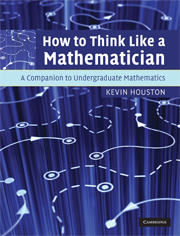Book contents
- Frontmatter
- Contents
- Preface
- I Study skills for mathematicians
- II How to think logically
- III Definitions, theorems and proofs
- 14 Definitions, theorems and proofs
- 15 How to read a definition
- 16 How to read a theorem
- 17 Proof
- 18 How to read a proof
- 19 A study of Pythagoras' Theorem
- IV Techniques of proof
- V Mathematics that all good mathematicians need
- VI Closing remarks
- Appendices
- Index
18 - How to read a proof
from III - Definitions, theorems and proofs
Published online by Cambridge University Press: 05 June 2012
- Frontmatter
- Contents
- Preface
- I Study skills for mathematicians
- II How to think logically
- III Definitions, theorems and proofs
- 14 Definitions, theorems and proofs
- 15 How to read a definition
- 16 How to read a theorem
- 17 Proof
- 18 How to read a proof
- 19 A study of Pythagoras' Theorem
- IV Techniques of proof
- V Mathematics that all good mathematicians need
- VI Closing remarks
- Appendices
- Index
Summary
Nullius in verba.
Translation: Take nobody's word for it. Latin proverbAs we have stated, proof is central to mathematics; without proof mathematics loses its power. In this section we show how to approach a proof and break it down to manageable, understandable pieces. Important clues and helpful hints as to why a theorem is true are often removed in the final written version of a proof. The construction lines are erased, and, unfortunately, it is up to the reader to reconstruct them. Think of the proof as being a tight bundle you have to unpack.
You may need some more experience to get the full benefit from the following advice; a lot of it should make sense straight away but rereading at a later date could be useful.
A simple theorem and its proof
The following theorem is easy to understand. It has similarities with Theorem 1 in the previous chapter but is different. The subsequent proof will be the primary example in this chapter.
Theorem 18.1
Let m and n be natural numbers. The product mn is odd if and only if m and n are odd.
Does this theorem seem reasonable? Why is it different to Theorem 1 of the previous chapter? Apply the ideas of that chapter to this new statement.
Information
- Type
- Chapter
- Information
- How to Think Like a MathematicianA Companion to Undergraduate Mathematics, pp. 119 - 125Publisher: Cambridge University PressPrint publication year: 2009
